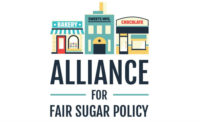Study: Reform of U.S. Sugar Policy Would Help Consumers, Jobs
Reforming federal sugar subsidies can save American consumers up to $3.5 billion and generate 20,000 new jobs each year, according to a new study by Iowa State University researchers.
A new study by researchers at Iowa State University, Ames, Iowa, shows that in the absence of current sugar policies, food industry jobs would increase as production and exports of sugar-containing products grow, and as imports of such products from other countries decline.
“This study clearly shows the impact of the high costs of the current sugar policy, but also tells us about the potential for consumers, small businesses and workers to benefit from a better policy,” says Larry Graham, president of the National Confectioners Association, Washington, D.C., and chairman of the Coalition for Sugar Reform, Washington, D.C. “The report should caution Congress against any last-minute attempts to extend the current sugar program without the opportunity to debate changes.”
“Some sugar lobbyists would like to sneak an extension of the current anti-consumer, anti-business sugar policy into the un-amendable deficit-reduction bill that the Super Committee is working on,” continued Graham. “But this would be a huge boondoggle and a miscarriage of justice that would rob Congress of the chance to bring sugar policy into the 21st century.”
In addition, the U.S. sugar policy continues to have a significant impact on American consumers.
"Consumers are paying billions of dollars per year in higher prices as a result of our current sugar policies," says Chris Waldrop, director of the Food Policy Institute at the Consumer Federation of America, Washington, D.C. "It is past time to reform this outmoded program."
Commissioned by the Sweetener Users Association, Washington, D.C., the study was conducted by John Beghin, professor of International Agricultural Economics, and Amani Elobeid, a senior analyst, both at at Iowa State University. It projected future prices, employment and other important variables if current sugar policies were abolished.
Although sugar reform could take many forms, a scenario with no programs is the best framework to illustrate the costs of current policy and the potential benefits if its costs were not imposed on society. “Looking at the complete elimination of the sugar program is the purest way to estimate the various effects and transfers on all agents,” the study says.
Highlights of the findings include:
• American consumers would gain up to $3.5 billion a year in savings on a wide variety of food products.
• The U.S. food industry would employ as many as 20,000 additional workers each year.
• The sugar-containing products sector-which is now a net importer-would become a net exporter, accounting for part of the employment gain and modestly reducing the U.S. trade deficit.
• Although profit margins in the sugar sector would decline from current inflated levels, they would actually remain near their historic range, the industry would continue to be profitable and production would stabilize near current levels.
• The 2008 Farm Bill inflated sugar crop returns by squeezing supplies and forcing higher prices: During 2009-11, returns per acre over variable costs for sugarbeets ($863 per acre) were more than double the returns for corn ($405) and nearly three times the return for soybeans ($324).
• Compared to 2006-07 and 2008-09, the past two years under the 2008 Farm Bill saw returns over variable costs increase by $342,000 for a 2,000-acre sugarcane farm and $142,500 for a 500-acre sugarbeet farm. (Total returns would have been far more-these numbers represent only the increase compared to the prior three years.)
• The Farm Bill also provided windfalls to sugar processing. For example, the average sugarbeet factory saw its gross margin increase by more than $75 million in the first years of the 2008 farm bill, compared to the prior period.
To view the full study, go to http://sugarreform.org/resources/economic-studies.
A new study by researchers at Iowa State University, Ames, Iowa, shows that in the absence of current sugar policies, food industry jobs would increase as production and exports of sugar-containing products grow, and as imports of such products from other countries decline.
“This study clearly shows the impact of the high costs of the current sugar policy, but also tells us about the potential for consumers, small businesses and workers to benefit from a better policy,” says Larry Graham, president of the National Confectioners Association, Washington, D.C., and chairman of the Coalition for Sugar Reform, Washington, D.C. “The report should caution Congress against any last-minute attempts to extend the current sugar program without the opportunity to debate changes.”
“Some sugar lobbyists would like to sneak an extension of the current anti-consumer, anti-business sugar policy into the un-amendable deficit-reduction bill that the Super Committee is working on,” continued Graham. “But this would be a huge boondoggle and a miscarriage of justice that would rob Congress of the chance to bring sugar policy into the 21st century.”
In addition, the U.S. sugar policy continues to have a significant impact on American consumers.
"Consumers are paying billions of dollars per year in higher prices as a result of our current sugar policies," says Chris Waldrop, director of the Food Policy Institute at the Consumer Federation of America, Washington, D.C. "It is past time to reform this outmoded program."
Commissioned by the Sweetener Users Association, Washington, D.C., the study was conducted by John Beghin, professor of International Agricultural Economics, and Amani Elobeid, a senior analyst, both at at Iowa State University. It projected future prices, employment and other important variables if current sugar policies were abolished.
Although sugar reform could take many forms, a scenario with no programs is the best framework to illustrate the costs of current policy and the potential benefits if its costs were not imposed on society. “Looking at the complete elimination of the sugar program is the purest way to estimate the various effects and transfers on all agents,” the study says.
Highlights of the findings include:
• American consumers would gain up to $3.5 billion a year in savings on a wide variety of food products.
• The U.S. food industry would employ as many as 20,000 additional workers each year.
• The sugar-containing products sector-which is now a net importer-would become a net exporter, accounting for part of the employment gain and modestly reducing the U.S. trade deficit.
• Although profit margins in the sugar sector would decline from current inflated levels, they would actually remain near their historic range, the industry would continue to be profitable and production would stabilize near current levels.
• The 2008 Farm Bill inflated sugar crop returns by squeezing supplies and forcing higher prices: During 2009-11, returns per acre over variable costs for sugarbeets ($863 per acre) were more than double the returns for corn ($405) and nearly three times the return for soybeans ($324).
• Compared to 2006-07 and 2008-09, the past two years under the 2008 Farm Bill saw returns over variable costs increase by $342,000 for a 2,000-acre sugarcane farm and $142,500 for a 500-acre sugarbeet farm. (Total returns would have been far more-these numbers represent only the increase compared to the prior three years.)
• The Farm Bill also provided windfalls to sugar processing. For example, the average sugarbeet factory saw its gross margin increase by more than $75 million in the first years of the 2008 farm bill, compared to the prior period.
To view the full study, go to http://sugarreform.org/resources/economic-studies.
Looking for a reprint of this article?
From high-res PDFs to custom plaques, order your copy today!





